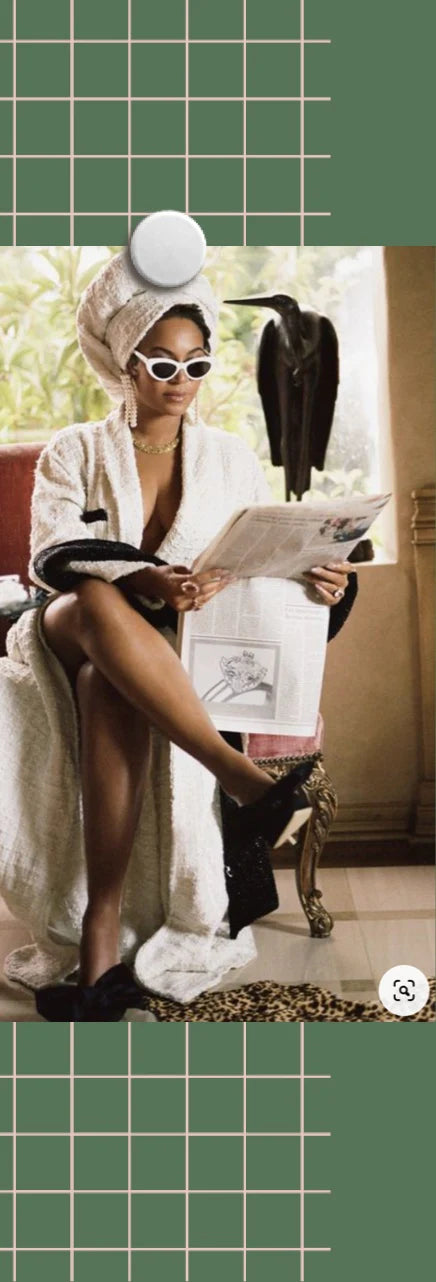







Everything I Know About “Daddy Issues”, Feminism, Financial Literacy, and Love

THE BIG SHARE - BY ROSA-LEE O’REILLY
When one says they have "daddy issues," it can mean a conglomeration of layered experiences, behaviours, and perspectives; a giant spiderweb of psychological patterns. Often brushed off as a joke, having "daddy issues" has a detrimental mental impact on one's life– in particular, one's financial life. "Daddy issues" and their cosy relationship with money can take shape in all forms of comfort, control, confusion, and criticism. Often, daddy's credit card being tied to your phone bill and a Netflix account doesn't just come at a literal cost; it also comes at a psychological cost.
Research clarifies that parents' financial choices and behaviours affect their children. Rather than teaching me the skills to be smart with my money, my dad created a great deal of stress and scarcity surrounding money. My dad chose to pontificate over communicate. To pontificate means to speak at someone, the speaker being at the centre. A definition I found states that pontification "expresses opinions or judgments" and is "less of a process and more of a static delivery mechanism for information the messenger has deemed valuable." This chosen communication style my dad delivered was not only immensely unsatisfying, but it was also off-putting—it was like my presence in the conversation was an afterthought, if even a thought at all.
When I reflect on my life, I was (and probably still am) severely lacking in financial skills. What really were financial skills? What was a “money mindset?” What was budgeting? I have meditated on this self-proclaimed flaw of mine, marinating in the hopelessness of my omnipotent, dark cloud of a student loan, all the “wasted money” I have spent, and the guilt associated with not “being a good saver.” Why did I have this constant, incessant desire to buy–even when I had no money at all? As I nit-picked, poked, prodded, and ruminated on this issue further, I realized this all came from my father. My father, too, liked to buy. He also liked to control things–financially. This was exhibited in certain behaviours like having control over the family bank accounts, creating worry and fear when explaining everyday purchases, causing constant outbursts and arguments over money, and being emotionally manipulative in ways of said promises and criticisms. In response to the way my dad prevented me from developing my own financial independence, I learnt to avoid confrontational discussions about money. Ultimately, this manifested into a scarcity money mindset. And so, when I saw money, I didn’t know what to do with it or where to put it…so I spent it. Within the nuclear family, it is expected that the man is the controller of the finances–the head of the house. Within the nuclear family I grew up in, my mum would claim that the way my dad acted was his way of showing us love. “Your dad works hard to pay for the bills, to pay for this lovely house we live in, for our holidays,” she would say. But I knew better to know that this was not what love felt like. Love is the opposite of control. Love demands trust.
Because the patriarchy asserts that men’s income is their income, it fosters this idea that because it is “their” income they can control it. As much as fathers can be loving, kind, and generous with their money, they can also be manipulative, using money to superiority. To me, a dad, a father, otherwise known as "the man of the house," does not mean authority, power, or unpredictability; it means comfort, safety, and security. To me, "the man of the house" should not equate to any element of hardness. As Michael Housel's most prominent quote from his book, The Psychology of Money, goes: "Financial success is not a hard science. It is a soft skill, where your behaviour is more important than what you know." I think this is why fathers often fail to teach their daughters skills, particularly financial skills. They believe hardness is the way to success–because hardness is all they have ever known–neglecting that softness is where the most growth unfolds.
Throughout my life as a feminist, I have been unpacking my dysfunctional relationship with my father and how it has caused financial fractures in my life. Now, I do not put the blame solely on my father. I put the blame on the patriarchy for driving complicated emotional barriers for men when it comes to conversations around money. I also blame the troubling moralism attached to masculinity and money. Money, men, and manipulation stipulate an ongoing discussion–a discussion I frequently engage in with one of my dearest female friends. This friend is a studying psychologist and is an immediate worker for a women's shelter for women fleeing domestic violence. She routinely sees the way men use money to control women in their own homes, as well as the lack of financial education given to women. This friend has taught me more about money in the past year than my father has over my entire life. In one of our recent financial conversations, she told me, "Money is less about how much you make, but more about your mindset."
Up until now, my mindset towards money has been relatively silent. And I feel like this is because my entire life has been spent around men who do all the talking. I recently had a male friend show me his stocks (I could tell he loved it, as men love to "explain" things to women). As he was doing so, the rabbit-hole of questioning began. Why do I know nothing about this? Why did my father not teach me about this? Why do none of my female friends talk to me about this stuff? The fact was that it wasn't normalised for women to talk about stocks, sports, investments, profit-margins. Women are left out of these topics of discussion. These topics are left for the Mojo Dojo Casa Houses. Men are taught to talk about money, to bond over discussions of the current stock market. Women are taught to keep money a secret, to bond over what impulsive online purchases they are making.
We all know money and power go hand in hand. And unfortunately, throughout history, these hands have only been shaken between by men. However, as we women have begun the great migration to freedom, we have started to realise the micro-behaviours and aggressions of our male counterparts that inhibit our daily freedom to financial choices and decisions. Men can use money to control and cage women into their desired perimeter. But we women are not meant to be caged; we are meant to roam free range. Another thing my friend has taught me over the years is that: "Money is freedom.” The intersectionality between feminism and finance clearly convicts a case that knowledge around finance and money are a means to great freedoms for women.
The patriarchy taught me to tiptoe around men, to tiptoe around money. All in all, to fear everything associated with the two big M's. But as I talk and listen to the bad-ass, supportive, inspiring women I have so luckily found around me, I have had these epiphanies, these little post-nut clarities. I have realized that just as I have the freedom to re-parent myself, to unlearn and re-learn everything I have thought about finance, I can also re-direct my thinking. And what better time to start than now? The Curve is one example of how I have shifted my thinking from hopelessness and heaviness to optimism and liberation. The energy of being in a room full of women (or having two women talking to you through your AirPods on your way to work) is truly nothing but divine!
Going back to ways in which fathers can use money to abuse the connotations and constructions we have defined around "love," I want to clarify that money is not a form of love but a means to build a life you love. Money in all that it encompasses does not motivate me towards extravagance, nor inspires me towards excess. Money motivates me to move towards a simple dream: having a happy space where I can write, play, and feel deeply loved by those around me.
Dreaming asks of me that I invest in my future. And when I think of financially investing in my future, I do not think of expensive luxury brands or constant first-class holidays that my children won't even appreciate; I think of a home– a home with enough space for my family and me to sit around the dinner table and ask each other how each of our days were, a home with a backyard big enough to plant a plum tree and grow our vegetables, a home with a kitchen just big enough for two, so my kind, gentle, "man of the house" can grab me from behind and kiss me…so we can dance around in the morning sun while our coffee brews.
Simply and fundamentally, financially investing in my future means living comfortably, securely, and lovingly.

